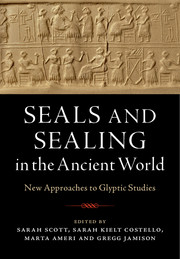 Seals and Sealing in the Ancient World
Seals and Sealing in the Ancient World from Part IV - Aegean
Published online by Cambridge University Press: 24 April 2018
The so-called Talismanic class is a distinctive group of Minoan incised beads that were manufactured during the Neopalatial period on Crete. Although their form matches that of seal stones, there has been a certain reluctance to believe that they were actually used sphragistically. For most types of incised beads from the Near East and Aegean we have impressions on clay that confirm their use in stamping and securing. However, for the numerous Talismanic-class stones we have few impressions preserved. Their style is also strikingly abstract in appearance in a time and place where artistic styles tended toward naturalism. Therefore, it has been proposed that Talismanic stones were magical amulets or imitation seals. Beyond basic facts about their materials, typology, and techniques, very little has been proposed recently in terms of their socio-historical context. However, by tying together evidence from the manufacturing process, the contexts in which they were produced, and the uses of seals in the ancient world, we can compare what we know of Talismanic-class stones to the wider cultural context of the Mediterranean Bronze Age. As a result, we can start to see a clearer picture of how the Talismanic-class stones were used and by whom.
To save this book to your Kindle, first ensure no-reply@cambridge.org is added to your Approved Personal Document E-mail List under your Personal Document Settings on the Manage Your Content and Devices page of your Amazon account. Then enter the ‘name’ part of your Kindle email address below. Find out more about saving to your Kindle.
Note you can select to save to either the @free.kindle.com or @kindle.com variations. ‘@free.kindle.com’ emails are free but can only be saved to your device when it is connected to wi-fi. ‘@kindle.com’ emails can be delivered even when you are not connected to wi-fi, but note that service fees apply.
Find out more about the Kindle Personal Document Service.
To save content items to your account, please confirm that you agree to abide by our usage policies. If this is the first time you use this feature, you will be asked to authorise Cambridge Core to connect with your account. Find out more about saving content to Dropbox.
To save content items to your account, please confirm that you agree to abide by our usage policies. If this is the first time you use this feature, you will be asked to authorise Cambridge Core to connect with your account. Find out more about saving content to Google Drive.